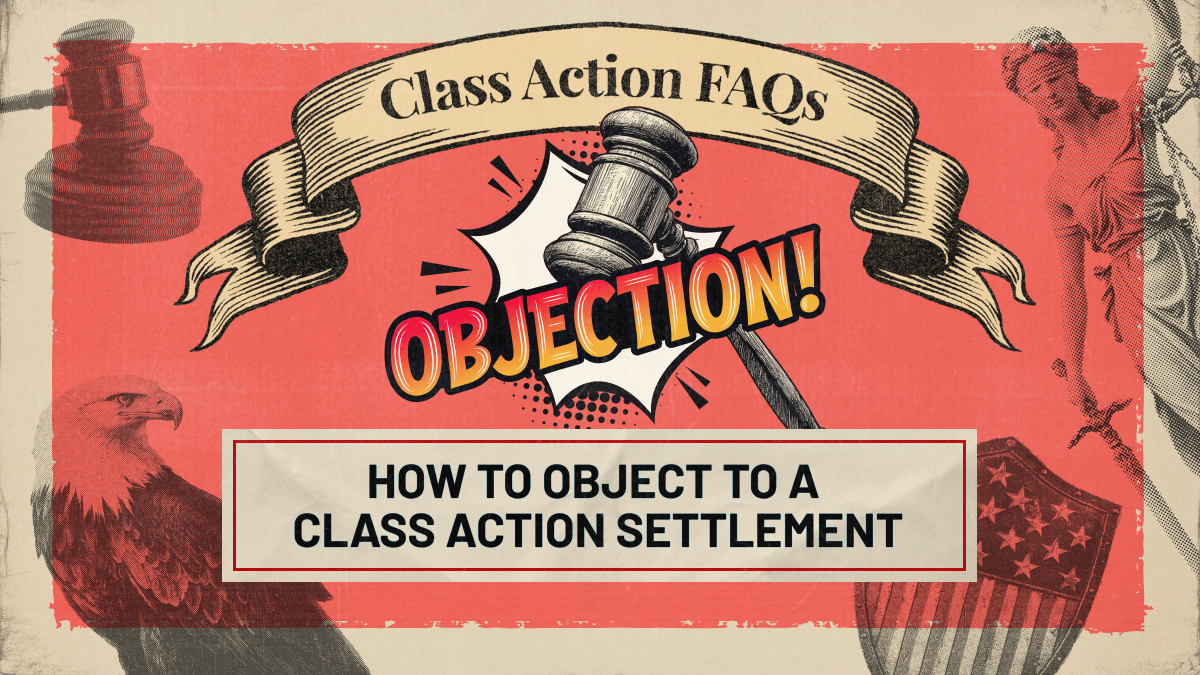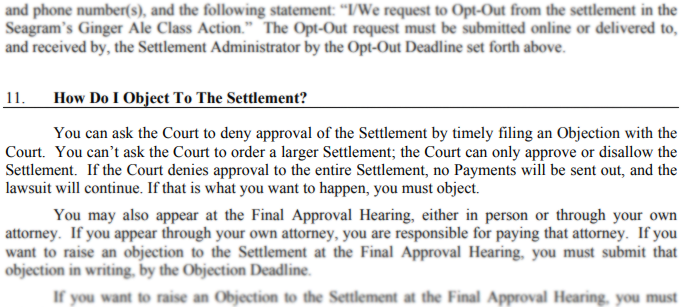Class Action FAQs: How to Object to a Class Action Settlement
by Erin Shaak
Last Updated on March 18, 2025

So, you’re unhappy with a class action settlement. Maybe you believe the plaintiffs’ attorneys are being paid too much, class members are being paid too little, or the defendant seems to be getting off scot-free.
Get class action lawsuit and settlement news sent to your inbox – sign up for ClassAction.org’s free weekly newsletter here.
Thankfully, you have some options. If you’re willing to put in a little work to fight for a better settlement, you can file an objection. Objections to class action settlements, though they require some time and effort on the objector’s part, can help ensure that class members are getting a fair deal.
Below, we’ll get into the ins and outs of objecting to a class action settlement so you can be prepared to exercise your rights.
On what grounds can I object to a class action settlement?
If you don’t think a settlement is “fair, reasonable, or adequate” to class members, you may have grounds to object. Those are the three main requirements that a judge will consider when deciding whether to approve a class action settlement.
Here are some reasons why someone might object to a settlement:
A proposed settlement should be the result of careful deliberation between the plaintiff(s) and defendant(s)—but if you believe class counsel or the class representative(s) did not have your best interests in mind, you may want to consider objecting to the deal.
What happens when I file an objection?
When you object to a class action settlement, the court will consider your objection before deciding to give a final OK to the deal at the final approval hearing.
Importantly, you can’t ask the judge to change specific terms of the settlement; you can only request that the court reject the deal entirely. If it does, the parties to the settlement need to go back to the drawing board and try to come up with a new agreement.
As you can imagine, objections can delay the settlement process by weeks, months, or even years. They’re one of the reasons it sometimes takes a long time for consumers to receive their class action settlement checks after filing claims. Settlement checks can’t be sent out until after all the objections have been considered, the deal is officially approved, and any appeals have been resolved.
That being said, objections are an important part of the class action process that allow class members to voice their concerns if they think the terms of a settlement are unfair.
How do I object to a settlement?
Your objection needs to be filed with the court overseeing the case by a set deadline. This involves sending in a written objection letter to the court, and sometimes to the attorneys on both sides.
Specific instructions for how to file an objection can be found in the settlement notice, which class members typically receive after the settlement has been submitted to the court for preliminary approval. The instructions might look something like this:

The settlement notice should contain all the information you need to know about how to file an objection, including what you need to write in the objection letter.
What should an objection letter look like?
Generally, an objection letter needs to include:
There may be additional information required, but the settlement notice you received should tell you exactly what to include. Here is an example of an objection letter.
Do I need to have a lawyer?
No, you don’t need to be represented by a lawyer to file an objection. An attorney would be able to help you navigate the legal landscape—even one mistake can cause your objection to be thrown out—but judges tend to be a bit more lenient when someone is not represented by counsel.
If you do hire a lawyer, though, you are responsible for paying him or her. Your lawyer’s compensation will not be part of the attorneys’ fees awarded to class counsel if the settlement is ultimately approved.
Do I have to go to court?
No, you don’t need to appear in court if you file an objection, but you can if you want to.
Objectors have the option of arguing their point before the judge at the settlement’s final approval hearing—when the judge weighs any objections and decides whether to approve the settlement—but you may need to inform the court beforehand if you intend to appear, so pay close attention to the instructions in the settlement notice.
If I file an objection, can I still participate in the settlement?
Yes. If your objection gets dismissed and the settlement is approved, you can still collect whatever compensation you are set to receive as a class member, but you must still file a claim by the deadline.
Even if you intend to object to a settlement, make sure you pay attention to the claim deadline. If the settlement requires class members to file a claim, you must do so in order to participate in the settlement. The deadline likely will have passed before you find out whether your objection was dismissed.
What’s the difference between objecting and opting out?
Objecting to a settlement is different from opting out or excluding yourself. Even if you object to a settlement, you’re still part of the class. That means if the settlement is ultimately approved, you forfeit your right to sue the defendant(s) separately over the same claims in the lawsuit.
The only way to retain your right to sue the defendant(s) on your own is to exclude yourself from the settlement, which will require sending notice to the court. If you do opt out, though, you forfeit your right to participate in any part of the settlement, including filing an objection, and you will receive no benefit from the deal. It’s a good idea to talk to an attorney before you decide to exclude yourself.
Do I have any more options if my objection is overruled?
If the court ultimately decides to dismiss your objection and approve the class action settlement, you may still have options. In some courts, you may be able to appeal the court’s decision, which, though it will delay the process even further, will provide you another opportunity to argue your point.
You may be required to appear at the final approval hearing in order to be eligible to appeal the decision. That’s why it might be a good idea to talk to an attorney; he or she will know what’s required for your specific case and can help you decide what steps to take.
I still have questions.
If you still have unanswered questions about objecting to a class action settlement, your best option is probably to reach out to a local attorney. Attorneys are authorized to give you tailored legal advice and can help you decide on the best way to proceed—plus, they often offer free initial consultations.
The American Bar Association’s website also offers some good resources, including help with finding a lawyer, options for free legal aid, and a wealth of legal information.
Want to stay in the loop on class actions that matter to you? Sign up for ClassAction.org’s free weekly newsletter here.
Video Game Addiction Lawsuits
If your child suffers from video game addiction — including Fortnite addiction or Roblox addiction — you may be able to take legal action. Gamers 18 to 22 may also qualify.
Learn more:Video Game Addiction Lawsuit
Depo-Provera Lawsuits
Anyone who received Depo-Provera or Depo-Provera SubQ injections and has been diagnosed with meningioma, a type of brain tumor, may be able to take legal action.
Read more: Depo-Provera Lawsuit
How Do I Join a Class Action Lawsuit?
Did you know there's usually nothing you need to do to join, sign up for, or add your name to new class action lawsuits when they're initially filed?
Read more here: How Do I Join a Class Action Lawsuit?
Stay Current
Sign Up For
Our Newsletter
New cases and investigations, settlement deadlines, and news straight to your inbox.
Before commenting, please review our comment policy.